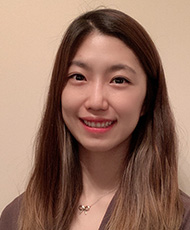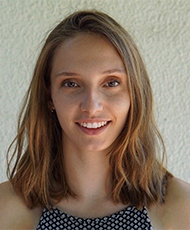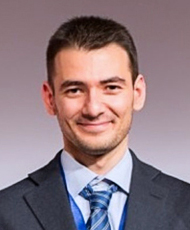Feature: Contributing to a better future
As three of 10 inaugural recipients of the Dean’s Research Scholarship, graduate trainees Surim Son, Fabio Salerno and Mila Uzelac are working on translational research projects that aim to improve care for dementia, cancer and kidney disease patients.
Launched in 2020, the Dean’s Research Scholarship supports MSc and PhD trainees engaged in collaborative research at Schulich Medicine & Dentistry.
“The School and University have a strong commitment to enhance collaborative and translational research, and I am very pleased that this new scholarship program will serve as one opportunity to achieve our goal in that realm,” said Dr. John Yoo, Dean.
 Surim Son, PhD Candidate, Epidemiology and Biostatistics
Surim Son, PhD Candidate, Epidemiology and Biostatistics
Supervisors: Mark Speechley, PhD, and Dr. Manuel Montero-Odasso
What is your research focused on?
My research is focused on lifestyle intervention to prevent cognitive impairment in older adults.
What are your goals with the research project?
My goals are to determine the most common clustering of lifestyle dementia risk factors in Canadian older adults and to understand their interrelationship with cognitive impairment.
What is the potential impact of your work?
My findings will be used to guide the decision-making for the optimal design of the CAN-THUMBS UP trial, which will be Canada’s contribution to the global prevention of dementia through vascular risk and lifestyle modification. My findings will contribute to minimizing the dementia burden and improving our aging experience.
What inspires you as a researcher?
I enjoy the process of synthesizing new knowledge and improving population health in different ways. As a researcher, we can always provide new evidence to address the current health challenges to improve our lives and the lives of our loved ones. What motivates me as a researcher is a chance to contribute to a better future.
How has being co-supervised by a clinician and basic scientist impacted your training experience?
It’s been a great experience. I can get insight from both the clinical perspective and the scientific methodological perspective, which increases the applicability of my research in public health. Under my supervisors’ guidance, I’m learning how to conduct scientific research to contribute to evidence-based practice.
 Mila Uzelac, MSc Candidate, Neuroscience
Mila Uzelac, MSc Candidate, Neuroscience
Supervisors: Dr. Matthew Hebb and Susanne Schmid, PhD
What is your research focused on?
My research focuses on investigating intratumoral modulation therapy (IMT) as a potential treatment for brain metastases of breast cancer origin. IMT uses bioelectrodes to deliver low-intensity electric fields directly to tumour tissue to reduce proliferation and promote apoptosis of cancerous cells. Our research group has already demonstrated these effects of IMT on glioblastoma, a primary brain tumour, but secondary brain tumours have a different biology and the impact of this therapy on cerebral metastases has not yet been studied.
What are your goals with the research project?
My primary goal is to show that stimulation with IMT will reduce proliferation and incite apoptosis in metastatic tumour cell populations in vitro, and that it will have a combinatorial effect with radiation and chemotherapy. Additionally, I would like to demonstrate the effects of this therapy in vivo using an animal model.
What is the potential impact of your work?
Brain metastases occur in 10 to 30 per cent of cancer patients and negatively impact their prognosis. The average survival for breast cancer metastases to the brain is between two to 25 months despite treatment, highlighting a need for new therapeutic approaches.
If successful, my project will yield key information needed for clinical translation of IMT with hopes that the therapy can prolong the survival and increase the quality of life of breast cancer patients with brain metastases.
What inspires you as a researcher?
I am motivated by my intellectual curiosity and my love for scientific innovation. Every time I think about my project, I realize there is still so much we don’t know about the topic, and I feel the need to fill these knowledge gaps. I want to investigate all these unanswered questions because it can lead to discoveries that have the potential to make advancements in the medical field.
How has being co-supervised by a clinician and basic scientist impacted your training experience?
Having completed my undergraduate degree in interdisciplinary medical sciences, I strived to land a graduate project that involved combining multiple scientific disciplines. I want to be a professional in my field; I want to be involved in all the aspects of my project instead of having the work divided between individuals of different expertise.
Due to my co-supervision, I had the privilege of culturing fresh brain tumour specimens at one lab while learning the necessary skills to grow them in an animal model at the other, giving me the ability to test IMT both in vitro and in vivo.
 Dr. Fabio Salerno, PhD Candidate, Medical Biophysics
Dr. Fabio Salerno, PhD Candidate, Medical Biophysics
Supervisors: Dr. Chris McIntyre and Grace Parraga, PhD
What is your research focused on?
My current research has a broad scope and could be synthesized as the application of multiple medical imaging techniques to several aspects associated with kidney failure requiring dialysis.
In particular, part of my research is focused on magnetic resonance imaging (MRI) to measure tissue sodium deposits in these patients. My other focus is the investigation of lung disease with inhaled hyperpolarized xenon-129 MRI and computed tomography in patients with kidney failure on hemodialysis.
What are your goals with this research project?
The goal of my research is to identify and develop clinically meaningful medical imaging targets to optimize dialysis care. This means proving that tissue sodium deposits are accumulated as the result of kidney failure, that they have negative effects on the health of kidney failure patients and their clearance with dialysis improves quality of life and life expectancy. It also involves defining the features of lung disease associated with kidney failure, currently considered a common but ill-defined complication in this patient population.
What is the potential impact of your work?
Dialysis is a process that removes excess water, solutes and toxins from the blood for people whose kidneys can no longer perform these functions naturally. Sodium is one of those toxins, building up in the skin and muscles. These deposits contribute to high blood pressure and heart disease, two important complications of kidney failure. Until recently, it was not possible to measure these deposits; we discovered that kidney failure patients can store great amounts of sodium.
Using MRI, we can guide sodium removal with dialysis and clear these deposits, improving the quality of care. Identifying the key features of lung disease associated with kidney failure will enable us to understand why so many patients use inhaled puffers to improve their breathing and to identify who would benefit from these medications.
What inspires you as a clinician-scientist?
Even before becoming a doctor, I was attracted to the experimental process that leads to research discovery. Over time, I have realized I really enjoy the ‘eureka’ moments that occasionally occur while pursuing my studies, and that excitement keeps me interested and engaged. With my experience as a clinician, I have also become aware of the impact that the lack of evidence has on everyday medical practice and people’s lives. Research has the power to change them, and this is now clearer than ever before with the COVID-19 pandemic.









